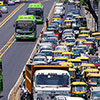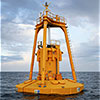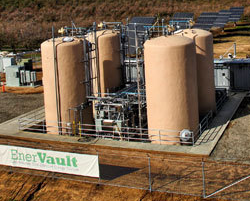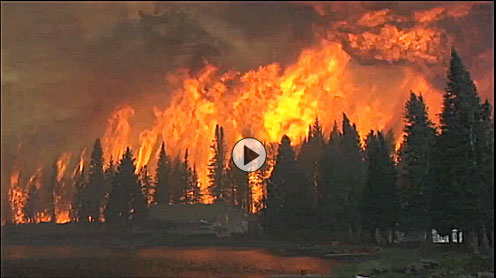
Analysis
by fred pearceWhile Germany continues to expand solar and wind power, the government’s decision to phase out nuclear energy means it must now rely heavily on the dirtiest form of coal, lignite, to generate electricity. The result is that after two decades of progress, the country’s CO2 emissions are rising.
Comments | READ MORE

Report
by elizabeth grossmanDairy operations in the U.S. are consolidating, with ever-larger numbers of cows concentrated on single farms. In states like Wisconsin, opposition to some large operations is growing after manure spills and improper handling of waste have contaminated waterways and aquifers.
Comments | READ MORE

Opinion
by timothy e. wirth and thomas a. daschleThe international community should stop chasing the chimera of a binding treaty to limit CO2 emissions. Instead, it should pursue an approach that encourages countries to engage in a “race to the top” in low-carbon energy solutions.
Comments | READ MORE
Analysis
 by ted williams
Brown pelicans were removed from the Endangered Species List in 2009, in what was considered a major conservation success story. But a recent crash in Pacific Coast populations of sardines, the pelican’s prime food, is posing new threats to these oddly elegant birds.
Comments | READ MORE
by ted williams
Brown pelicans were removed from the Endangered Species List in 2009, in what was considered a major conservation success story. But a recent crash in Pacific Coast populations of sardines, the pelican’s prime food, is posing new threats to these oddly elegant birds.
Comments | READ MORE

Report
by mike ivesHigh-speed bus systems in crowded urban areas have taken off from Brazil to China, but introducing this form of mass transit to the teeming Indian capital of New Delhi has proven to be a vexing challenge.
Comments | READ MORE

Report
by rebecca kesslerOriginating in Europe, "nature-like" fishways are now being constructed on some U.S. rivers where removing dams is not an option. Unlike traditional fish ladders, these passages use a natural approach aimed at significantly increasing once-abundant runs of migratory fish.
Comments | READ MORE

Analysis
by dave levitanResearchers have long contended that power from ocean waves could make a major contribution as a renewable energy source. But a host of challenges, including the difficulty of designing a device to capture the energy of waves, have stymied efforts to generate electricity from the sea.
Comments | READ MORE
Report
 by fred pearce
Congo's Virunga National Park has long been known for its mountain gorillas and for the lawless militias that operate there. But the recent shooting of the park warden and plans to begin oil exploration in the park have sparked new concerns about the future of this iconic World Heritage Site.
Comments | READ MORE
by fred pearce
Congo's Virunga National Park has long been known for its mountain gorillas and for the lawless militias that operate there. But the recent shooting of the park warden and plans to begin oil exploration in the park have sparked new concerns about the future of this iconic World Heritage Site.
Comments | READ MORE

Report
by richard conniffA recent study shows that a surprisingly large amount of the seafood sold in U.S. markets is caught illegally. In a series of actions over the last few months, governments and international regulators have started taking aim at stopping this illicit trade in contraband fish.
Comments | READ MORE

Report
by chris kraulHigh-altitude neotropical ecosystems known as páramos are increasingly at risk in Colombia and elsewhere in South America as major mining companies seek to exploit rich deposits of gold and other minerals. Such projects, scientists warn, could have serious impacts on critical water supplies.
Comments | READ MORE

Video Report: Americans on the
Front Lines of Climate Change
A fire chief in Colorado whose department is battling increasingly intense blazes in the American West. A Texas rancher struggling to operate in the face of years of drought. Oyster farmers in Washington state scrambling to adapt to increasingly acidic waters that are damaging their harvests. These Americans are the subjects of videos created by
The Story Group, a non-profit journalism initiative. The videos are meant to put a human face on the science behind the recently released
National Climate Assessment, which stressed that global warming is already having a major impact on the United States.
Watch the videos.New battery technology that uses cheaper and safer materials to store large amounts of energy may soon enable utility companies to use more renewable power,

Iron-chromium flow battery technology
MIT Technology Review. The new device is a type of flow battery, and it uses liquid materials that rely on iron-chromium chemical reactions to store energy. California-based startup Enervault, developer of the new battery, figured out how to use materials that had been tried in batteries decades ago; Enervault overcame a key technical challenge that had caused the earlier batteries to quickly degrade. The new battery is large — it can store one megawatt-hour of electricity, or enough to run 10,000 100-watt light bulbs for an hour — and the materials last more than 20 years, according to its developer. Although the battery is inefficient compared to conventional batteries — it loses 30 percent of the energy used to charge it — it is still economically viable, the company says. The iron-chromium flow battery costs 80 percent less than vanadium flow batteries, a competing technology. The batteries are currently in use at a small power plant near Modesto, California.
Interview: Putting San Francisco
On the Road to Zero Waste by 2020
For 20 years, Jack Macy has spearheaded San Francisco’s efforts to become a global leader in recycling. In an interview with
Yale Environment 360,

Jack Macy
Macy describes how San Francisco has succeeded in reusing or composting 80 percent of its garbage and how the city has engaged the public in a recycling crusade, allaying initial fears of “trash police” sifting through residents’ garbage. While San Francisco has made tremendous progress, Macy says further changes are needed. “Part of the principle of zero waste is that the local government can’t shoulder all the burden,” he says, “so it’s important that we encourage consumers to take responsibility for what they buy ... and producer responsibility for the products they design and market.”
Read more.The aircraft manufacturing giant Airbus
recently unveiled a fully-electric aircraft which, if widely adopted, could reduce the aerospace industry's carbon
.jpg)
The recently debuted, fully-electric E-Fan
dioxide emissions by an order of magnitude. The E-Fan aircraft has two, 30-kilowatt electric motors powered by a series of lithium-ion batteries in the wings of the plane, as well as a 6-kilowatt electric motor in the wheel to provide extra power during takeoff and taxiing. Despite incorporating highly energy-efficient and aerodynamic design elements, however, the E-Fan has only a one-hour range and cannot leave the vicinity of the airport. Airbus says that future designs will rely on electric-hybrid engine technology and that by 2050 such airplanes should be able to accommodate 70 to 80 passengers on a three-hour flight. The plans were spurred, in part, by the European Union's
Flight Path 2050, which aims to reduce the aviation sector's nitrous oxide emissions by 90 percent, noise pollution by 65 percent, and carbon dioxide emissions by 75 percent by 2050. "It's a very different way of flying," said Jean Botti, a technology officer at Airbus Group, "absolutely no noise, no emissions."
Interview: Can Marine Life Adapt
To the World’s Acidifying Oceans?
As the world’s oceans grow more acidic from increased absorption of atmospheric carbon dioxide, marine scientists are confronting a key question: How well can

Gretchen Hofmann
organisms like mollusks, crustaceans, and corals adapt to these more corrosive conditions? One of the leading authorities in this field is University of California, Santa Barbara marine biologist Gretchen Hofmann. Her work in recent years has shown, in fact, that some sea organisms that build shells do seem to have some ability to acclimate to more acidic waters. But in an interview with
Yale Environment 360, Hofmann cautions that this adaptive capacity has its limits. The continuing burning of fossil fuels, she says, could push ocean acidity past a tipping point, rendering some mollusks and other organisms unable to build shells.
Read the interview. If politicians and scientists want to convey the urgency and importance of a warming world, they are
far better off using the term "global warming" than “climate change,” according to a new report. Produced by researchers at the Yale Project on Climate Change Communication and George Mason University,
the report says that Americans are much more familiar with the term “global warming” and that it engenders more negative associations and concern. Based on recent surveys, the report said moderates, women, Hispanics, political independents, and younger Americans associate “global warming” with alarming developments such as melting glaciers and extreme weather. Among many groups, “global warming” also creates a greater sense of threat to one’s family and future generations. “Scientists often prefer the term climate change for technical reasons, but should be aware that the two terms generate different interpretations among the general public and specific subgroups,” the report said. The survey found that among Republicans the two terms are generally synonymous.

Yale Environment 360 is
a publication of the
Yale School of Forestry
& Environmental Studies.


Twitter: YaleE360
e360 on Facebook
Donate to e360
View mobile site
Bookmark
Share e360
Subscribe to our newsletter
Subscribe to our feed:
 About e360
Contact
Submission Guidelines
Reprints
About e360
Contact
Submission Guidelines
Reprints
 Yale Environment 360
Yale Environment 360 is sponsoring a contest to honor the best environmental videos.
Find more contest information.
Opinion
Reports
Analysis
Interviews
Forums
e360 Digest
Podcasts
Video Reports
Biodiversity
Business & Innovation
Climate
Energy
Forests
Oceans
Policy & Politics
Pollution & Health
Science & Technology
Sustainability
Urbanization
Water
Antarctica and the Arctic
Africa
Asia
Australia
Central & South America
Europe
Middle East
North America
 Yale Environment 360
Yale Environment 360 articles are now available in Spanish and Portuguese on
Universia, the online educational network.
Visit the site.
The latest
from
Yale
Environment 360 is now available for mobile devices at
e360.yale.edu/mobile.
 The Warriors of Qiugang
The Warriors of Qiugang, a
Yale Environment 360 video that chronicles the story of a Chinese village’s fight against a polluting chemical plant, was nominated for a 2011 Academy Award for Best Documentary (Short Subject).
Watch the video.

Top Image: aerial view of
Iceland. © Google & TerraMetrics.

In a
Yale Environment 360 video, photographer Pete McBride documents how increasing water demands have transformed the Colorado River, the lifeblood of the arid Southwest.
Watch the video.
















.jpg)










